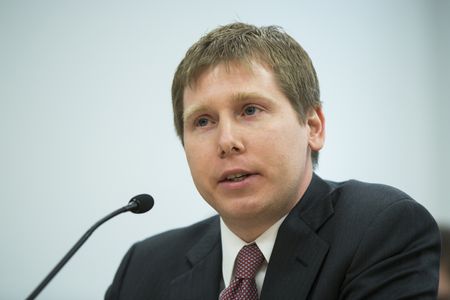By Niket Nishant, Hannah Lang and Tom Wilson
(Reuters) -Binance chief Changpeng Zhao will step down and plead guilty to breaking criminal U.S. anti-money laundering laws as part of a settlement resolving a years-long probe into the world’s largest crypto exchange, prosecutors said on Tuesday.
But he’s not the only one in regulators’ sights. As token prices plummeted last year, the sector saw other stunning meltdowns that put several industry moguls into authorities’ crosshairs.
Investigations are not necessarily an indication of wrongdoing, and charges may not result in convictions. All the executives below have denied wrongdoing.
Changpeng ‘CZ’ Zhao
Zhao is a Canadian citizen who was born and raised until the age of 12 in China. He founded Binance in Shanghai in 2017 but later moved the exchange to Tokyo and then Malta. Its holding company is based in the Cayman Islands.
The billionaire owns properties in Dubai’s high-end Burj Khalifa tower and Singapore, corporate records show, yet rarely indulges in ostentatious shows of wealth.
While Zhao, 46, projects to his 8.6 million followers on social media platform X image of humility, Reuters reported last year that he maintained a tight grip on Binance’s operations – a powerful leader committed to secrecy and focused on market domination.
In addition to Tuesday’s settlement with the Department of Justice, Commodity Futures Trading Commission and the Treasury Department, the Securities and Exchange Commission (SEC) sued Binance and Zhao in June for allegedly operating “a web of deception.”
The SEC alleged that Binance artificially inflated its trading volumes, diverted customer funds, failed to restrict U.S. customers from its platform and misled investors about its market surveillance controls.
The company has said the SEC’s lawsuit was “unjustified by the facts, by the law, or by the Commission’s own precedent.”
Sam Bankman-Fried
Onetime crypto poster child Bankman-Fried was this month found guilty of defrauding customers of his now-bankrupt crypto exchange FTX, in a high-profile criminal case that rocked the industry. The jury reached the verdict after just over four hours of deliberations.
Bankman-Fried, who had pleaded guilty, told jurors he mismanaged the exchange but had not defrauded customers.
It was a sudden and dramatic fall from grace for the tech entrepreneur who had amassed billions of dollars in personal wealth running FTX and had become a prominent and respected figure in Washington and globally.
Do Kwon
A South Korean national, Do Kwon co-founded Terraform Labs and developed the TerraUSD and Luna currencies. The market value of TerraUSD and Luna was once estimated at more than $40 billion, and their downfall precipitated a wider collapse in token prices.
Kwon faces multiple charges of fraud in the U.S. and was arrested in Montenegro earlier this year for allegedly forging documents, authorities said. The SEC has also filed civil charges against Kwon and Terraform Labs, accusing the two of “orchestrating a multi-billion dollar crypto asset securities fraud.”
Kwon has denied forging documents, according to a Montenegrin court press release. In an Oct. 30 court filing, Terraform said the “SEC is evidentiarily no closer to proving that the defendants did anything wrong.”
Alex Mashinsky
The founder and former CEO of crypto lender Celsius Network’s company filed for bankruptcy in July 2022.
He has pleaded not guilty to U.S. fraud charges that he misled customers and artificially inflated the value of his company’s proprietary crypto token. In January, New York state’s attorney general sued Mashinsky, also alleging fraud. A lawyer for Mashinsky at the time said he denied those allegations and “looks forward to vigorously defending himself in court.”
Mashinsky also faces lawsuits from the SEC, the CFTC and the U.S. Federal Trade Commission (FTC) that allege he touted Celsius as safe even as the company took increasingly risky steps to deliver promised returns of as much as 17%.
Barry Silbert
Silbert is the boss of crypto group Digital Currency Group whose subsidiary Genesis Global Capital filed for bankruptcy in January.
He was sued by New York Attorney General Letitia James last month along with Genesis and DCG, alleging that they defrauded customers of more than $1 billion.
Silbert called the allegations baseless and said he would fight the lawsuit in court.
“Last year, my and DCG’s goal was to help Genesis weather the storm… and position Genesis for success going forward. It is unfortunate that this lawsuit omits that fundamental fact,” he said.
Stephen Ehrlich
Stephen Ehrlich’s Voyager Digital is another casualty of last year’s crypto meltdown. The CFTC and the FTC have accused him of misleading customers about the safety of their assets while taking “excessive risks” that led to the crypto lender’s demise.
Ehrlich has said he was being used as a “scapegoat for the bad actions of others at different companies.”
“Having spent nearly my entire career working in regulated markets, including more than 10 years at public companies, I have never had a single blemish on my record,” he said in a statement last month.
Justin Sun
The SEC in March charged Chinese cryptocurrency entrepreneur Justin Sun and his companies including the Tron Foundation with fraud, accusing him of artificially inflating trading volume for his companies’ crypto tokens and concealing payment to celebrities to promote those tokens.
Sun said in a post on social media platform X that the complaint “lacks merit.”
(Reporting by Niket Nishant and Hannah Lang in Washington and Tom Wilson in London; Editing by Michelle Price and Lisa Shumaker)








